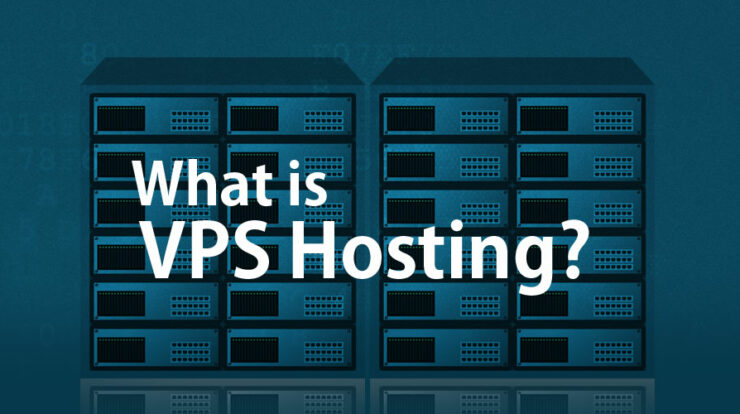
Shared hosting is a more safe and more dependable option than VPS, which does not provide you with dedicated server space. However, it is on a smaller scale and less expensive than renting a whole server.
VPS hosting is usually chosen by website owners whose traffic is too high for a shared hosting plan but not high enough to need a dedicated server. Virtual private server solutions typically include many hosting plans.
What Is the Process of VPS Hosting?
A server is a machine that your web host uses to store the files and databases for your website. When an online visitor requests your website, their browser makes a request to your server, which then transfers the appropriate data over the internet. VPS hosting offers you a virtual server that mimics a physical server. However, the machine is shared by several customers.
Your hosting provider builds a virtual layer on top of the server’s operating system (OS) using virtualization technologies. This layer splits the server and lets each user install their own operating system and apps.
As a result, because you have total control, a virtual private server (VPS) is both virtual and private. At the OS level, it is isolated from other server users. In fact, VPS technology is like setting up partitions on your own computer so you can run different operating systems (like Windows and Linux) without having to restart.
Running a VPS allows you to host your website in a secure container with assured resources (memory, storage space, CPU cores, and so on) that you do not have to share with other users. VPS hosting gives you the same access to the root level as a dedicated server, but it costs a lot less.
Checkout: Which is a better option for you Shared Hosting or VPS?
VPS vs. Other Types of Web Hosting
Different forms of web hosting allow you to customise your server to varying degrees. They differ in terms of cost, performance (e.g., page load time), and service availability (e.g., uptime). Read on to see how VPS hosting compares to other hosting options.
Website owners with little traffic might consider shared hosting. It is where most small companies and blogs begin. Even with the most powerful shared hosting package, you share the same physical server with a number of other hosting business customers. Since your website uses the same operating system as everyone else’s, you don’t get any special tools.
As a result, the memory and computing power available to your site are influenced by the demands of other service users. For example, if a website housed on the same server experiences a sudden rise in traffic, the page load time may increase. You cannot select your operating system or other server software because everyone uses the same setup. Overall, your hosting provider is in charge of every element of your shared hosting environment.
Consider shared hosting to be a rental in which you share the same residence with a number of housemates. VPS hosting is still a type of flatshare, but each person has their own room that they or can customise to their or liking. For example, they can select paintings, furniture, and décor.
If you want to move your website from shared hosting to VPS, read this post.
Cloud Computing
Cloud hosting services employ a cluster of servers that run in the cloud rather than a single server. Each server in the cluster keeps a current copy of your website. When one of the servers becomes overloaded, the cluster automatically sends traffic to a less overloaded server. So, cloud hosting has no downtime because there is always a server in the cluster that can handle requests from your website visitors.
Hosting for WordPress
WordPress hosting is a service provided solely to WordPress website owners. It includes various WordPress-related features that are only available if you already have a WordPress site, such as one-click installation, pre-installed plugins, and a WP command-line interface. WordPress-specific servers have been set up. Because of this, companies that host websites offer WordPress hosting as part of their shared hosting packages.
Although it is feasible to set up a WordPress site on a virtual private server, you will not have access to the custom-built servers that have been configured specifically for WordPress. However, if you pick a VPS for your WordPress site, you may build up and modify your hosting environment to meet your specific business requirements.
Hosting for Dedicated Servers
With dedicated hosting, you rent a whole physical server for your business. If you have a high-traffic website, dedicated hosting may be the ideal option because dedicated servers are fast, versatile, and completely configurable. However, because the service is not free, it is not for everyone, especially if you run a small or medium-sized website.
Dedicated hosting, unlike VPS hosting, allows you to pick and customise your operating system and server software. It allows you to configure not just the software but also the hardware, as the entire server is yours and no one else has any say in the configuration. You can also run a dedicated server locally, like at your office, but you won’t have the help of a professional hosting team.
Benefits & Drawbacks of VPS
If you want a specific service, VPS hosting may be the best option for you. In the sections that follow, you can find out about the pros and cons of hosting a virtual private server.
Pros
- It is more stable and speedier than a shared hosting server.
- Because server resources like memory and processing power are assured, there is little to no volatility in available resources.
- Other server users’ problems and traffic spikes have no effect on your site.
- You are granted superuser (root) privileges on your server.
- Since other server users can’t access your files and databases, you have more privacy.
- It’s a simple service to scale. As your website grows, you can quickly add more RAM, CPU, disc space, bandwidth, etc. to your server.
Cons
- It costs more than shared hosting.
- Setting up your VPS takes more technical expertise, but there are several tutorials accessible online.
- Server administration is more technically difficult than shared or cloud services.
- Improperly set up servers might lead to security flaws.
When Should You Use It and How Do You Know When It’s Time to Upgrade?
VPS hosting is typically seen as the next step when your website has outgrown the resource constraints of shared hosting. If the most sophisticated shared hosting plan is no longer sufficient to keep your website running efficiently, you should consider upgrading to a VPS plan. VPS hosting gives you the best of both shared and dedicated hosting in these situations.
However, there are some situations when starting with a VPS plan from the beginning is a fantastic option. Ecommerce websites, for example, that require secure payments in a quick and stable environment, might greatly benefit from a virtual private server. In reality, if you store sensitive data or have to handle online payments, a virtual private server (VPS) can help you limit the risk of security breaches and identity theft.
A VPS hosting package might also be beneficial if you anticipate traffic spikes on your site at specific periods, such as in the case of an event organiser or ticket-selling website. Game servers like CS: GO and Minecraft, as well as other resource-intensive websites, perform significantly better on a virtual private server.
Is There an Alternative to VPS? What Exactly Is a Managed VPS?
One of the most significant disadvantages of VPS hosting is having to handle the complete server environment on your own. If you don’t set up and maintain your virtual server correctly, you could lose a lot of security and performance. Managed VPS hosting services have emerged as a possible answer to this issue. Consider it an improved version of VPS hosting that includes complete technical assistance.
Conclusion
VPS hosting provides you with assured resources and complete control without the need to manage your own server. It’s a fantastic option for resource-intensive, e-commerce, and websites with medium to high traffic. Businesses that predict quick development, on the other hand, might profit from the service’s steadiness. If you want a dependable, business-scale hosting environment at a reasonable price, consider VPS hosting for your website. Consider Cyberpanel VPS hosting powered by LiteSpeed for a simple setup since it comes with a pre-installed control panel and a fast LiteSpeed webserver.
FAQs
What is the purpose of a virtual private server?
A virtual private server (VPS) is a virtual system that delivers virtualized server resources on a physical server shared by other customers. VPS hosting gives you a dedicated server space with a certain number of resources. This gives you more control and flexibility than shared hosting.
Is a VPS the same as a VPN?
A VPN serves only one purpose: to keep your data private and secure when accessing the internet. A virtual private server (VPS) is a service given by a hosting firm to host a website or application. While it can eventually be used to connect to the internet, it does not keep your information safe by default.
What is the distinction between VPS and VDS?
A VDS may connect to a distant dedicated server, whereas a VPS is a virtual machine (VM) that runs on top of a physical server and hosts VPS instances and transmits host device resources. VDS is a flexible tool that lets you change the way your status infrastructure works and fit it into your overall design.




